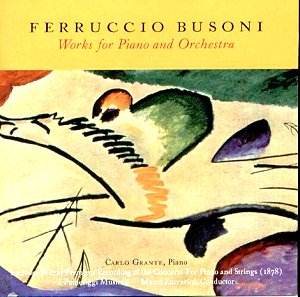Though the recording details are hazy – no date
or location – this disc serves a useful purpose in charting Busoni’s
increasing mastery of, and confidence in, concerto form. This
isn’t altogether surprising given that the earliest of the three
works here, for Piano and string quartet, was written when he
was a precocious youth of twelve. Twenty minutes, and four movements,
in length it receives here its premiere recording. Carlo Grante’s
piano is granted an unlikely perspective – very upfront and unnaturally
lit. At least the compensatory features are those of sheer admiration
at Busoni’s fusion of classical formality and individual touches
of personalised nuance (as for example in the very opening piano
statement which seems to appear before its due time, rather impishly).
There are few anticipations of the mature Busoni here but there
are numerous reflections of his early love for and absorption
of Mozartian models. In the slow movement, though, the piano’s
hesitant entries speak of other influences. For all the world
sounding like a mid-period Beethoven sonata this Adagio has an
unexpected seriousness but also a chaste intimacy and delicacy.
The more intense sections are imbued with a baroque spirit. There’s
something Schubertian about the lyrical Scherzo and whilst the
finale is more conventional it reveals no little compositional
skill. There is also a good sense of interplay between the solo
piano and the accompanying group, here expanded beyond the quartet
to a small chamber group.
The Concertstück dates from 1890 when Busoni
was twenty-four. It won him the Rubinstein Prize for composition
but its debt to Brahms is clear; often invigoratingly so. Some
of the harmonies are quite complex and Busoni utilises more baroque
procedures as well. This gives the work a sense of span and an
almost documentary feel. The very Brahmsian passagework lacks
Brahms’ depth, of course, but I particularly admired the pulsatingly
chordal solo section that heralds the arrival of the fugato section
– a disconcerting brief fugue though. Elsewhere Busoni uses some
burnished horn melodies that add an attractive layer of solidity
and lyrical craft to the writing.
The Indian Fantasy is very much more terra cognita
as far as the discography is concerned. Completed in 1915 it is
more quintessential Busoni than the two earlier works. It is not
without its deeply problematic side, with regard to construction.
Essentially this is a three section, one movement work in which
the sections are linked by piano cadenzas. Busoni knows precisely
how to conjoin moments of rough drive with reflective stasis,
holding the active and passive components of the dialogue in just
accord. The folk-like music conjoins with the more argumentative
drive of Busoni’s schema to produce a sometimes frustrating but
always intriguing musical argument. Again Grante is too far forward
when it comes to a reasonable balance between piano and orchestra.
Against that his pianism is impressive, enthusiastic, comprehensive,
technically eloquent and idiomatic. I Pomeriggi Musicali under
the conductor Marco Zuccarini accompany well, though the balance,
that exaggerates Grante, sometimes diminishes their contribution.
Still, a most enthusiastic welcome.
Jonathan Woolf
